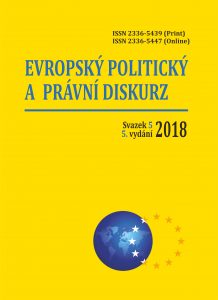The procedure of reviewing (scientific expertise) is applied to all articles submitted to the editorial board, with the exception of reviews and informational messages. The following order for manuscript reviewing has been established by the editorial board:
- Authors submit an article to the editorial board that complies with the requirements of the journal “European Political and Legal Discourse” and the rules for article preparation. Manuscripts that do not meet the accepted requirements are not registered and are not considered further, with authors being notified accordingly.
- Each article submitted to the editorial board undergoes two levels of review based on research profiles: open – internal and external (see “Ethical Standards of the Journal…”).
- The administrative editor of the corresponding research profile section of the journal “European Political and Legal Discourse” conducts the review and appoints reviewers. In certain circumstances, at the decision of the Chief Editor of the journal, the appointment of reviewers may be entrusted to a member of the editorial board. In specific cases, the issue of selecting reviewers is resolved during the editorial board meeting. Outstanding articles from eminent scholars, as well as articles written by authors specially invited by the editorial board, may be exempted from the standard reviewing procedure based on the Chief Editor’s decision (in accordance with the recommendations of responsible editors of the sections).
- The reviewers can be either members of the editorial board of the scientific journal “European Political and Legal Discourse” or external highly qualified specialists who possess deep professional knowledge and experience in specific professional fields.
**Internal Review Process**
*The internal review process is conducted within 14 days of manuscript submission. After receiving feedback from the internal reviewer, the manuscript is sent to external reviewers who are leading experts in the subject matter of the article. Upon the agreement of the invited reviewer and upon ensuring compatibility with the author’s research direction and the absence of any conflicts of interest, the scientific evaluation of the article is typically completed within 30 days. The review timelines may be adjusted on a case-by-case basis to ensure the most objective assessment of the provided materials. Interaction between the author and reviewers takes place via email communication with the administrative editor of the relevant research profile in the “European Political and Legal Discourse” journal. Upon request and with the consent of the editorial board’s working group, the interaction between the author and the reviewer may occur through direct personal contact, a decision made only if openness in communication enhances the style and logical presentation of the research material without creating potential conflicts of interest.*
*In the event that the reviewer recommends specific revisions to the article, the manuscript is returned to the author with suggestions to either incorporate the comments in the revised version or provide well-founded counterarguments. The revised version of the article should be accompanied by a response letter addressing all reviewer comments and explaining all changes made. The resubmitted manuscript is then subjected to the reviewer for a final decision and the preparation of a reasoned conclusion regarding its suitability for publication. The date of the article’s acceptance for publication is considered the date when the editorial board receives a positive conclusion from the reviewer (or a decision from the editorial board) regarding the suitability and possibility of publication.*
*Should the author disagree with the reviewer’s opinion, they have the right to provide a well-justified response to the journal’s editorial office. Under such circumstances, the article is discussed during the editorial board’s working group meeting. The editorial board may decide to send the article for additional or new reviewing by another specialist. The editorial board reserves the right to reject the article if the author is unable or unwilling to consider the reviewers’ recommendations and remarks.*
**Literary and Technical Editing**
*After receiving positive reviews, the manuscript undergoes literary and technical editing. The interaction between the author and the technical editor can take various forms, including in-person meetings, email correspondence, or phone discussions. Minor stylistic or formal adjustments that do not affect the content of the article are made by the technical editor without prior consultation with the author.*
**Final Decision and Publication**
*The Chief Editor, based on the recommendations of the administrative editor of the relevant research profile, makes the final decision regarding the feasibility and appropriateness of publication. Once the decision to accept the article for publication is made, the journal’s administrative editor informs the author, providing an estimated timeline for publication.*



